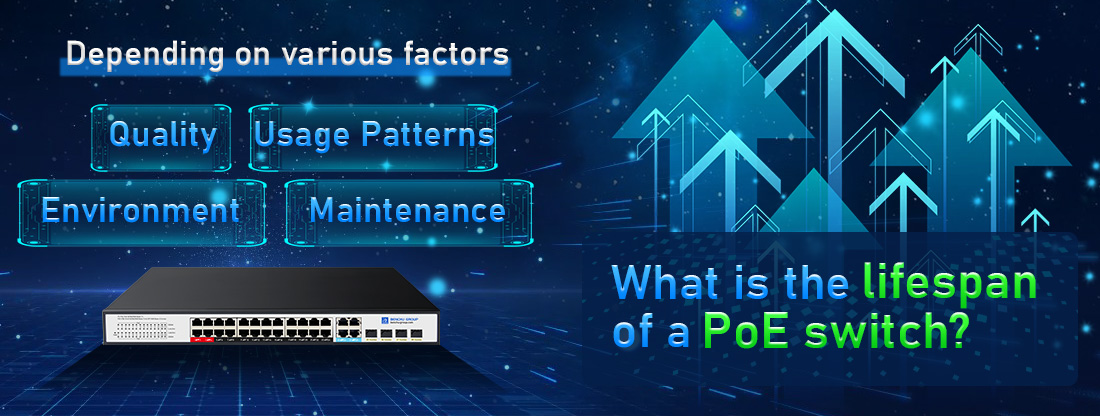
The lifespan of a Power over Ethernet (PoE) switch typically ranges from 5 to 10 years, depending on various factors. These include the quality of the switch, its environment, usage patterns, and maintenance. Here are key factors that can influence the lifespan of a PoE switch:
1. Build Quality and Brand
--- High-quality, enterprise-grade switches from reputable manufacturers (such as Cisco, HP, Juniper, or Netgear) generally have longer lifespans due to superior components and design.
--- Lower-end or budget switches may have a shorter lifespan, especially if they are used in demanding environments.
2. Power and Load Demands
Power Output Requirements: PoE switches that are running near their maximum power output consistently (especially with PoE+ or PoE++ devices) can experience more stress on their power supplies, which could reduce their lifespan.
Power Budget: Switches that are used to power many high-power devices (such as IP cameras or wireless access points) may experience more wear and tear, affecting the power supply’s durability.
3. Operating Environment
Temperature: PoE switches placed in environments with poor ventilation, excessive heat, or exposure to extreme temperatures may experience a shorter lifespan. Heat is a major factor that degrades electronic components over time.
Humidity and Dust: Environments with high humidity or dust levels can also lead to premature failure due to corrosion or clogged cooling systems.
Outdoor Environments: Outdoor PoE switches need to be ruggedized to withstand harsh conditions like rain, temperature extremes, and physical wear, which could affect their longevity.
4. Usage and Duty Cycle
Continuous Operation: PoE switches that are operating 24/7 and consistently powering devices may wear out faster than those used intermittently or with fewer connected devices.
Heavy Network Traffic: Switches that handle a high volume of network traffic (such as in security monitoring or office settings) may experience more strain, reducing their lifespan.
5. Firmware and Software Support
--- Regular firmware updates and software patches can improve the performance and security of a PoE switch, potentially extending its lifespan by preventing security vulnerabilities or performance issues.
Discontinued Support: Some switches may still be physically operational but could become obsolete if the manufacturer stops providing updates or technical support, especially as new standards or technologies emerge.
6. Maintenance
--- Regular maintenance of PoE switches, such as cleaning dust from the ventilation systems and ensuring proper cooling, can help extend their life.
Power Cycling: Occasional power cycling of switches can prevent overheating or component fatigue, particularly for those running continuously.
Signs a PoE Switch is Reaching End-of-Life:
--- Frequent Failures or Outages: If devices connected to the switch frequently lose power or connection, it could be a sign that the switch is nearing the end of its functional life.
--- Decreased Performance: Slow data transfer speeds, frequent network interruptions, or an inability to provide sufficient power to connected devices may indicate the switch is wearing out.
--- Overheating: If the switch frequently overheats despite being in a properly ventilated area, it may indicate internal components are deteriorating.
Conclusion:
On average, a well-maintained, enterprise-grade PoE switch can last 7 to 10 years, while budget models may last around 5 to 7 years. Proper environmental conditions, usage patterns, and regular maintenance are crucial to maximizing the lifespan of a PoE switch.